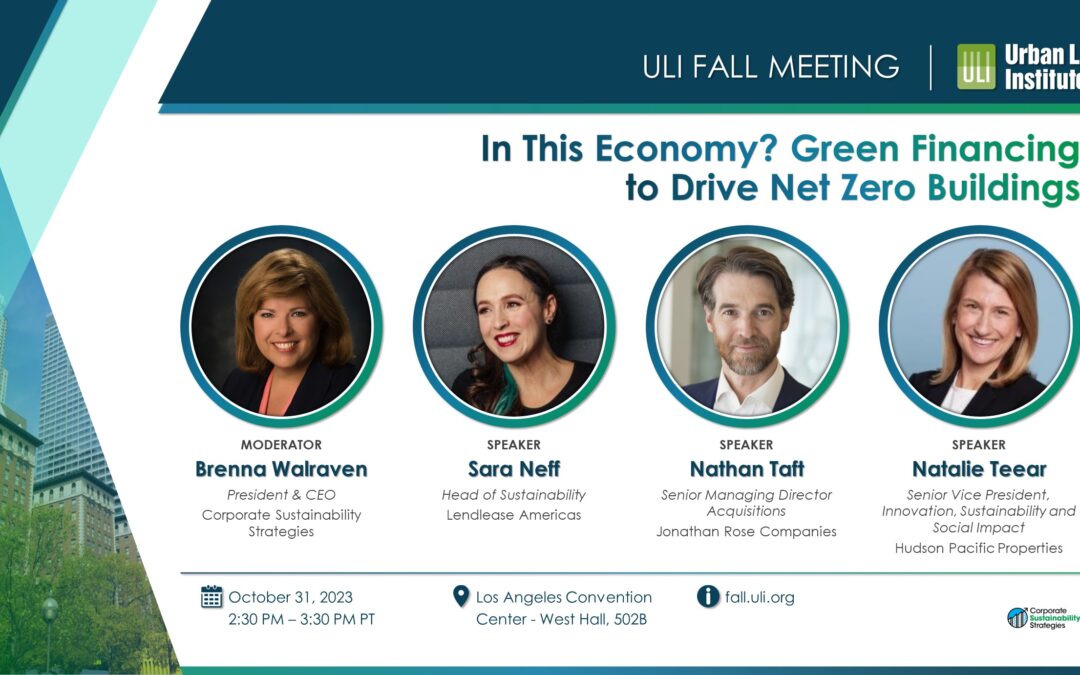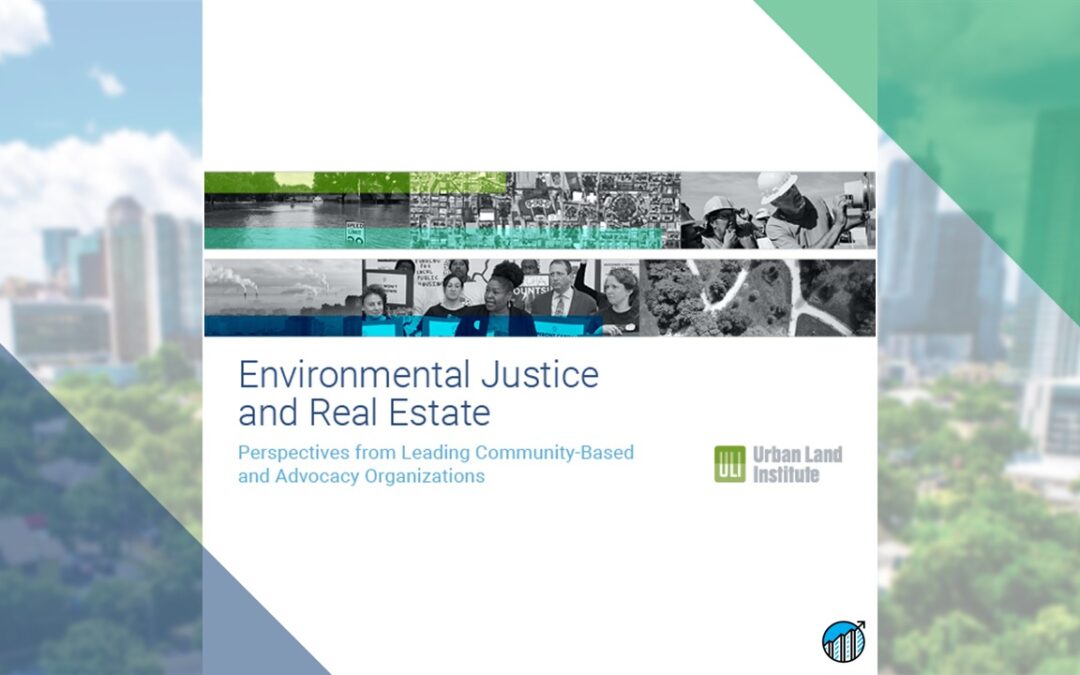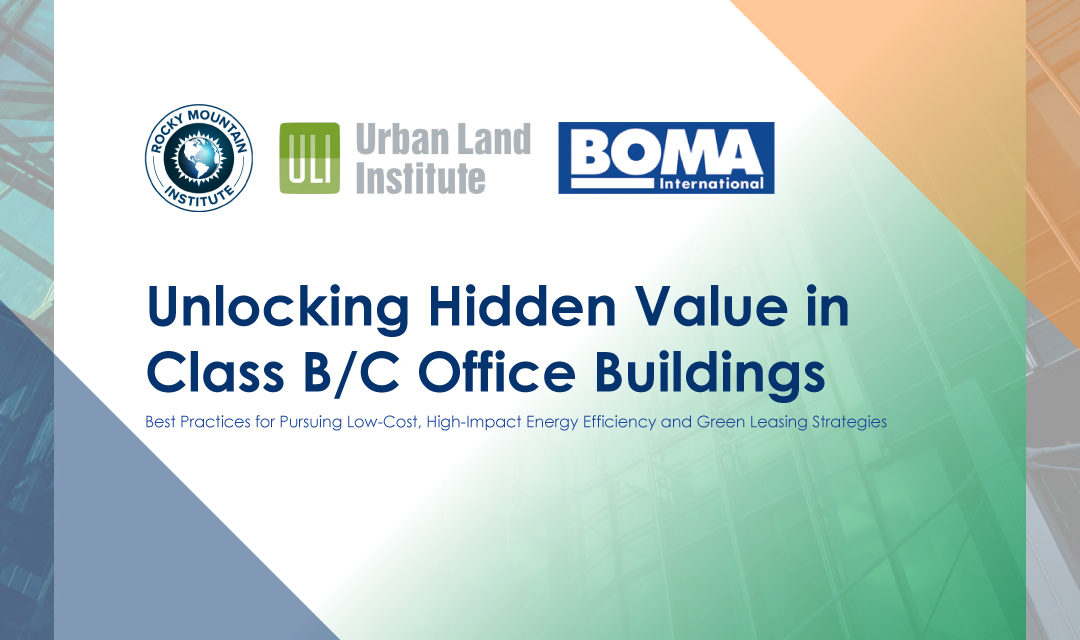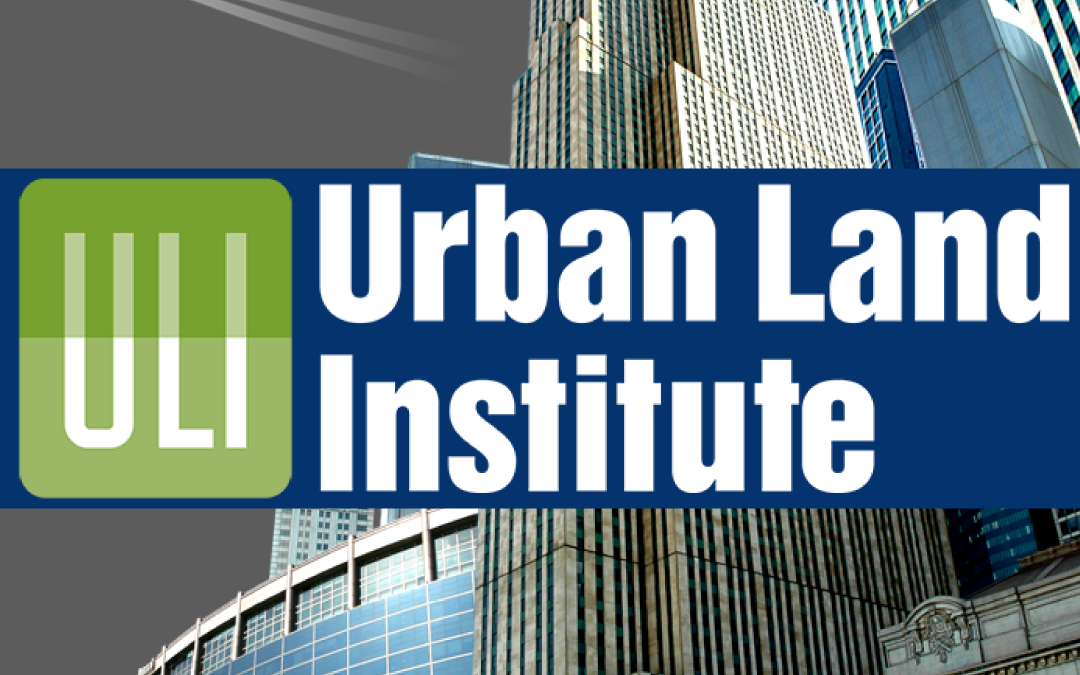
Oct 24, 2023 | Events, Homepage
There is a common concern that incorporating sustainability in new developments and existing renovations is cost-prohibitive. However, numerous green finance initiatives exist to address this challenge. This session will explore several approaches to green finance for the real estate sector: green bonds, green loans, C-PACE loans, IRA funding, and other local green financing mechanisms. In addition to a short overview of each, real estate practitioners will highlight specific use cases that demonstrate the diverse opportunities for financing low-carbon projects to make the business case that enables accelerated building decarbonization.
register

Aug 23, 2021 | Articles, Homepage
Environmental Justice and Real Estate: Perspectives from Leading Community-Based and Advocacy Organizations, a new publication released by the Urban Land Institute (ULI), explores the environmental justice movement and highlights the role real estate can play in contributing to sustainable, resilient, and equitable development, particularly through engagement and partnership with community organizations. Low-income communities and communities of color who contribute the least to environmental crises are often most at risk from climate or environmental hazards.
This publication features four interviews with community and advocacy organizations and thought pieces by ULI members that collectively provide insight into how real estate actors can support collaborative solutions and equitable built environments for all.
Read the full report on ULI’s Knowledge Finder.
About Urban Land Institute
ULI is a global, member-driven organization comprising more than 45,000 real estate and urban development professionals dedicated to advancing the Institute’s mission of shaping the future of the built environment for transformative impact in communities worldwide. ULI’s interdisciplinary
membership represents all aspects of the industry, including developers, property owners, investors, architects, urban planners, public officials, real estate brokers, appraisers, attorneys, engineers, financiers, and academics. Established in 1936, the Institute has a presence in the Americas, Europe, and the Asia Pacific region, with members in 80 countries.
Learn More
ULI’s Center for Sustainability and Economic Performance
ULI’s Urban Resilience Program
ULI’s Greenprint Center for Building Performance

May 13, 2020 | Events, Homepage
For Class B and C office buildings, there is a largely untapped business opportunity to improve their energy performance.
Multiple constraints have led Class B/C buildings to adopt energy efficient practices into their general business practice at a slower rate than Class A assets. However, incorporating energy efficiency investments and green leasing clauses into these buildings provides an excellent opportunity to add long-term value, through lower energy costs and better alignment with tenants.
To provide an outline for how to simplify and streamline energy efficiency and green leasing opportunities for Class B/C office buildings that are appropriately tailored to the reality of the market, Building Owners and Managers Association (BOMA) worked with Rocky Mountain Institute (RMI) and Urban Land Institute (ULI) to create the Unlocking Hidden Value in Class B/C Office Buildings report.
Join BOMA, RMI, and ULI for this webinar highlighting key takeaways from the report and how to overcome the traditional challenges to energy efficiency in the Class B/C market. The webinar will also feature experts from both the property owner and property manager perspective speaking to how they gained a competitive edge from implementing energy efficiency and green leasing in Class B/C office buildings.
Learning Objectives
- How to get started on energy efficiency in a Class B/C office building by understanding local efficiency regulations, identifying opportunities to improve, and benchmarking performance over time.
- How to optimize resources to prioritize low-cost, high-value energy efficiency projects to achieve cost savings, energy savings, and buildings that are more comfortable to tenants.
- How to reduce the cost-burden of capital-intensive energy efficiency retrofits through different financing options.
- How to modernize the standard lease form to improve the economics of efficiency projects and engage tenants.
Presenters
- Bill Moebius, Senior Vice President/Regional Director, Peloton Commercial Real Estate
- Brenna Walraven, President and CEO, Corporate Sustainability Strategies
- Joey Cathcart, Associate, Rocky Mountain Institute
- Matt Praske, Director of Energy and Sustainability, WashREIT
- Marta Schantz (Moderator), SVP, Greenprint Center for Building Performance, Urban Land Institute
- Joanne Arnold, Director of Research and TOBY, BOMA International
Date and Time
Thursday, May 28, 2020
1:00PM EDT
Register
Join Us!

May 9, 2018 | Events
Corporate Sustainability Strategies is pleased to announce Brenna Walraven is moderating Financing for Sustainable Real Estate Projects: Resources & Results for Urban Land Institute (ULI).
About the Webinar
As the business case for sustainable investments in real estate has grown, capital market entrepreneurs have developed new tools and strategies to finance real estate energy efficiency and renewable energy projects.
The third in ULI’s Responsible Property Investment Council’s (RPIC) webinar series, this one-hour webinar will provide an overview of some of the new tools helping developers get access to low-interest capital to finance sustainable new developments and energy efficiency property retrofits.
Panelists will discuss:
- New lower interest “Green mortgages”
- efficiency-as-a-service contracts, and
- Property Assessed Clean Energy (PACE) programs, as well as
- some traditional finance tools that can be used to improve the economics of sustainable real estate project investments
Panelists:
- Rachel Davis, Business Development Officer, Petros PACE Finance
- Joe Indvik, Founder & Principal, Rock Creek Consulting LLC
- Chrissa Pagitsas, Director, Green Financing Business, Fannie Mae
- Brenna Walraven (moderator), President & CEO, Corporate Sustainability Strategies, Inc.
Date & Time
Wednesday, May 23, 2018
1:00-2:00 PM EDT
Learn more about ULI’s webinar here.
About RPIC
The Responsible Property Investment Council (RPIC) aims to accelerate adoption and firmly embed “triple bottom line” principles as a core part of any real estate investment strategy and decision making process. What distinguishes the council is a proactive intent to deploy capital that generates risk adjusted market rate returns while creating social and/or environmental value. The Council focuses on a people-centered approach to real estate investment. Council conversations and presentations delve into the links between resource use, cutting edge technology and building practices, protection of the natural environment and improvement in the lives of people, all of which serve to create robust economic returns.
Learn more about RPIC here.
About ULI
Urban Land Institute is a 501(c) (3) nonprofit research and education organization supported by its members. Nearly 40,000 members worldwide, represent the entire spectrum of land use and real estate development disciplines working in private enterprise and public service. A multidisciplinary real estate forum, ULI facilitates an open exchange of ideas, information, and experience among industry leaders and policy makers dedicated to creating better places.
Learn more about ULI here.




